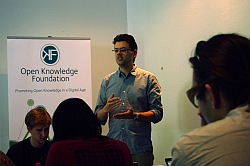Posted: March 23rd, 2012 | Author: Sven | Filed under: journals, Opinion | Tags: academic publishing, access to data, Linking Data and Publications | 1 Comment »
 Already a while ago, in fall 2010 the Journal of Neuroscience announced that it will stop hosting and peer-reviewing supplementary material for articles, so authors are no longer allowed to include any additional materials when they submit new manuscripts. A radical cut and a practice I haven’t heard of yet.
Already a while ago, in fall 2010 the Journal of Neuroscience announced that it will stop hosting and peer-reviewing supplementary material for articles, so authors are no longer allowed to include any additional materials when they submit new manuscripts. A radical cut and a practice I haven’t heard of yet.
Despite the fact that this journal is neither part of our research sample for EDaWaX’s work package 2 nor in the scientific field of Economics it is worth to investigate the motivation for banning the supplements.
And of course it is interesting to notice what the journal proposes to do instead of hosting and peer-reviewing supplementary material. Read the rest of this entry »
Posted: March 12th, 2012 | Author: Sven | Filed under: Conference, EDaWaX | Tags: Conference, Goportis, RDM, research data management | 1 Comment »
 Those of you attending the German Bibliothekartag in Hamburg (22 – 25 May 2012) should be aware of an interesting session on research data management and add it to your personal conference program:
Those of you attending the German Bibliothekartag in Hamburg (22 – 25 May 2012) should be aware of an interesting session on research data management and add it to your personal conference program:
On May 24 there will be a session on “new structures and demands in scientific libraries – research data management in the Leibniz Library Network for Research Information.” In this session Goportis, the Leibniz Library Network for Research Information, is presenting some of its projects on RDM.
Read the rest of this entry »
Posted: March 8th, 2012 | Author: Sven | Filed under: Projects | Tags: Data Sharing, Datasets, Open Data | Comments Off on Open Economics Workgroup provides information and data sets
 Since spring 2011 the Open Economics Workgroup is active in the UK and beyond. The workgroup is run by the Open Knowledge Foundation in association with the Centre for Intellectual and Property Law (CIPIL) at the University of Cambridge.
Since spring 2011 the Open Economics Workgroup is active in the UK and beyond. The workgroup is run by the Open Knowledge Foundation in association with the Centre for Intellectual and Property Law (CIPIL) at the University of Cambridge.
The members of the working group consist of leading academics and researchers, public and private sector economists, representatives from national and international public bodies and other experts from around the world.
Read the rest of this entry »
![]() Already a while ago, in fall 2010 the Journal of Neuroscience announced that it will stop hosting and peer-reviewing supplementary material for articles, so authors are no longer allowed to include any additional materials when they submit new manuscripts. A radical cut and a practice I haven’t heard of yet.
Already a while ago, in fall 2010 the Journal of Neuroscience announced that it will stop hosting and peer-reviewing supplementary material for articles, so authors are no longer allowed to include any additional materials when they submit new manuscripts. A radical cut and a practice I haven’t heard of yet.
 Since spring 2011 the
Since spring 2011 the 





